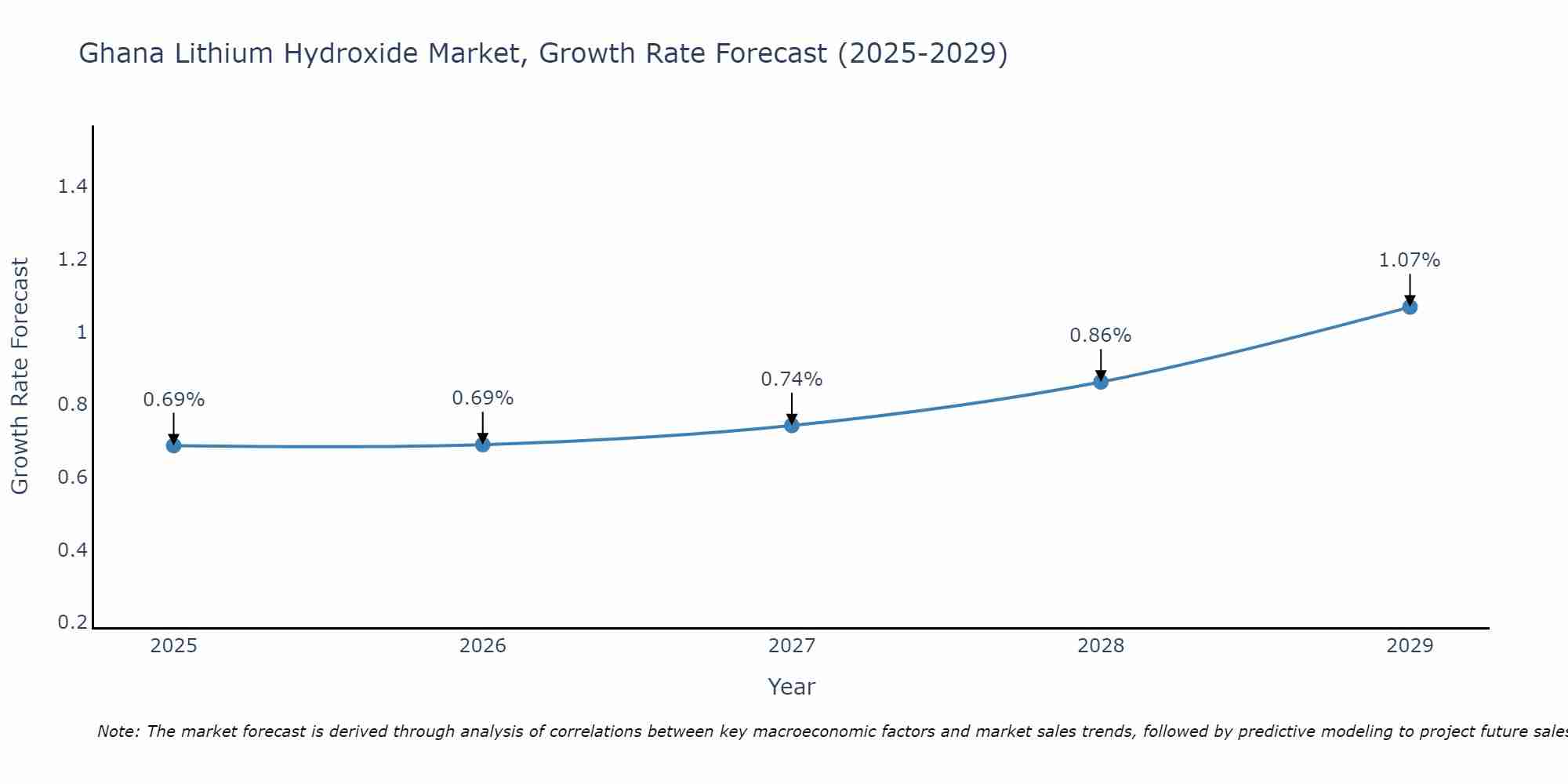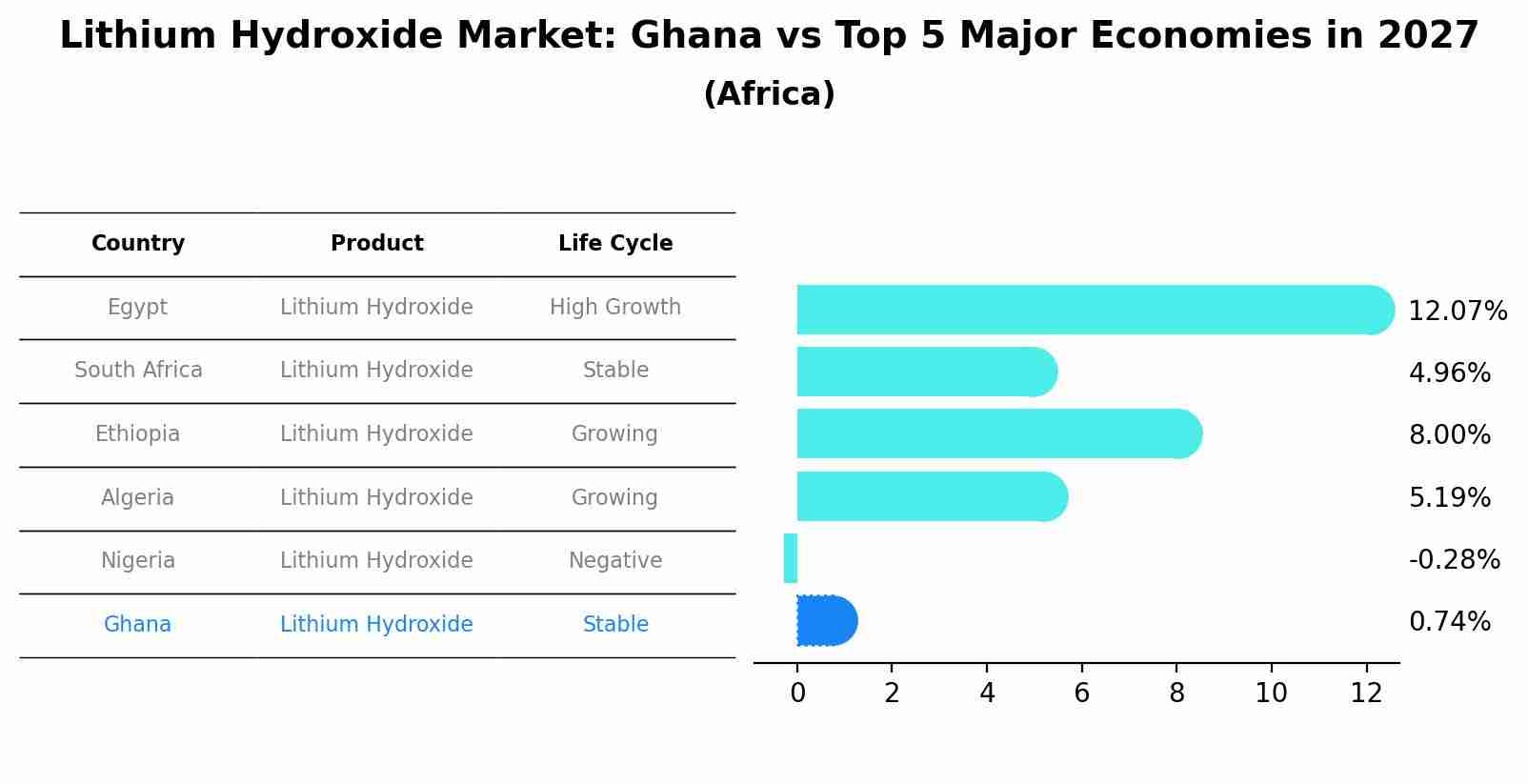Ghana Lithium Hydroxide Market (2025-2031) Outlook | Trends, Forecast, Value, Companies, Size, Industry, Share, Analysis, Growth & Revenue
| Product Code: ETC195308 | Publication Date: May 2022 | Updated Date: Aug 2025 | Product Type: Market Research Report | |
| Publisher: 6Wresearch | Author: Ravi Bhandari | No. of Pages: 60 | No. of Figures: 40 | No. of Tables: 7 |
Ghana Lithium Hydroxide Market Size Growth Rate
The Ghana Lithium Hydroxide Market is likely to experience consistent growth rate gains over the period 2025 to 2029. Commencing at 0.69% in 2025, growth builds up to 1.07% by 2029.

Lithium Hydroxide Market: Ghana vs Top 5 Major Economies in 2027 (Africa)
The Lithium Hydroxide market in Ghana is projected to grow at a stable growth rate of 0.74% by 2027, highlighting the country's increasing focus on advanced technologies within the Africa region, where Egypt holds the dominant position, followed closely by South Africa, Ethiopia, Algeria and Nigeria, shaping overall regional demand.

Ghana Lithium Hydroxide Market Overview
The lithium hydroxide market in Ghana is experiencing growth, propelled by the increasing demand for lithium hydroxide as a key component in the production of high-performance lithium-ion batteries for electric vehicles, renewable energy storage, and consumer electronics. Lithium hydroxide, derived from lithium carbonate or lithium brine, serves as a lithium source and pH regulator in battery cathode materials, enabling efficient energy storage and power delivery. With Ghana interest in clean energy solutions and electric mobility, the market for lithium hydroxide is expected to continue expanding in the country.
Drivers of the market
The Ghana lithium hydroxide market is experiencing growth driven by the expanding lithium-ion battery manufacturing industry. Lithium hydroxide`s usage as a key raw material in high-performance lithium-ion batteries for electric vehicles, energy storage systems, and consumer electronics is driving market expansion in the country.
Challenges of the market
Challenges in the lithium hydroxide market include supply chain constraints and evolving battery technologies. Ensuring a stable supply of high-purity lithium hydroxide for battery manufacturing amid increasing demand requires investment in extraction and processing infrastructure. Additionally, adapting to changes in battery chemistries and specifications driven by advancements in electric vehicle and energy storage technologies is crucial for market competitiveness.
Government Policy of the market
The Ghana government acknowledges the growing significance of lithium hydroxide in various industries, particularly in the production of lithium-ion batteries for electric vehicles, energy storage systems, and portable electronics. To support the lithium hydroxide market, the government may implement policies aimed at promoting the production, processing, and export of lithium-bearing minerals. This could include providing incentives for lithium mining and extraction companies, supporting research and development initiatives to enhance mineral processing technologies and lithium recovery rates, and facilitating access to international markets for Ghana lithium hydroxide products. Additionally, the government may collaborate with industry stakeholders to address challenges such as mineral resource management, environmental sustainability, and market competitiveness in the lithium hydroxide market.
Key Highlights of the Report:
- Ghana Lithium Hydroxide Market Outlook
- Market Size of Ghana Lithium Hydroxide Market, 2024
- Forecast of Ghana Lithium Hydroxide Market, 2031
- Historical Data and Forecast of Ghana Lithium Hydroxide Revenues & Volume for the Period 2021-2031
- Ghana Lithium Hydroxide Market Trend Evolution
- Ghana Lithium Hydroxide Market Drivers and Challenges
- Ghana Lithium Hydroxide Price Trends
- Ghana Lithium Hydroxide Porter's Five Forces
- Ghana Lithium Hydroxide Industry Life Cycle
- Historical Data and Forecast of Ghana Lithium Hydroxide Market Revenues & Volume By Application for the Period 2021-2031
- Historical Data and Forecast of Ghana Lithium Hydroxide Market Revenues & Volume By Batteries for the Period 2021-2031
- Historical Data and Forecast of Ghana Lithium Hydroxide Market Revenues & Volume By Lubricating Greases for the Period 2021-2031
- Historical Data and Forecast of Ghana Lithium Hydroxide Market Revenues & Volume By Purification for the Period 2021-2031
- Historical Data and Forecast of Ghana Lithium Hydroxide Market Revenues & Volume By Others for the Period 2021-2031
- Ghana Lithium Hydroxide Import Export Trade Statistics
- Market Opportunity Assessment By Application
- Ghana Lithium Hydroxide Top Companies Market Share
- Ghana Lithium Hydroxide Competitive Benchmarking By Technical and Operational Parameters
- Ghana Lithium Hydroxide Company Profiles
- Ghana Lithium Hydroxide Key Strategic Recommendations
Frequently Asked Questions About the Market Study (FAQs):
1 Executive Summary |
2 Introduction |
2.1 Key Highlights of the Report |
2.2 Report Description |
2.3 Market Scope & Segmentation |
2.4 Research Methodology |
2.5 Assumptions |
3 Ghana Lithium Hydroxide Market Overview |
3.1 Ghana Country Macro Economic Indicators |
3.2 Ghana Lithium Hydroxide Market Revenues & Volume, 2021 & 2031F |
3.3 Ghana Lithium Hydroxide Market - Industry Life Cycle |
3.4 Ghana Lithium Hydroxide Market - Porter's Five Forces |
3.5 Ghana Lithium Hydroxide Market Revenues & Volume Share, By Application, 2021 & 2031F |
4 Ghana Lithium Hydroxide Market Dynamics |
4.1 Impact Analysis |
4.2 Market Drivers |
4.2.1 Increasing demand for lithium-ion batteries in electric vehicles and consumer electronics |
4.2.2 Government initiatives to promote renewable energy sources |
4.2.3 Growing focus on sustainable energy storage solutions |
4.3 Market Restraints |
4.3.1 High production costs associated with lithium hydroxide extraction and processing |
4.3.2 Fluctuating prices of lithium in the global market |
4.3.3 Competition from other lithium-producing countries |
5 Ghana Lithium Hydroxide Market Trends |
6 Ghana Lithium Hydroxide Market, By Types |
6.1 Ghana Lithium Hydroxide Market, By Application |
6.1.1 Overview and Analysis |
6.1.2 Ghana Lithium Hydroxide Market Revenues & Volume, By Application, 2021-2031F |
6.1.3 Ghana Lithium Hydroxide Market Revenues & Volume, By Batteries, 2021-2031F |
6.1.4 Ghana Lithium Hydroxide Market Revenues & Volume, By Lubricating Greases, 2021-2031F |
6.1.5 Ghana Lithium Hydroxide Market Revenues & Volume, By Purification, 2021-2031F |
6.1.6 Ghana Lithium Hydroxide Market Revenues & Volume, By Others, 2021-2031F |
7 Ghana Lithium Hydroxide Market Import-Export Trade Statistics |
7.1 Ghana Lithium Hydroxide Market Export to Major Countries |
7.2 Ghana Lithium Hydroxide Market Imports from Major Countries |
8 Ghana Lithium Hydroxide Market Key Performance Indicators |
8.1 Exploration and development of lithium reserves in Ghana |
8.2 Investment in lithium extraction technologies and infrastructure |
8.3 Adoption and implementation of sustainable practices in lithium production |
9 Ghana Lithium Hydroxide Market - Opportunity Assessment |
9.1 Ghana Lithium Hydroxide Market Opportunity Assessment, By Application, 2021 & 2031F |
10 Ghana Lithium Hydroxide Market - Competitive Landscape |
10.1 Ghana Lithium Hydroxide Market Revenue Share, By Companies, 2024 |
10.2 Ghana Lithium Hydroxide Market Competitive Benchmarking, By Operating and Technical Parameters |
11 Company Profiles |
12 Recommendations |
13 Disclaimer |
- Single User License$ 1,995
- Department License$ 2,400
- Site License$ 3,120
- Global License$ 3,795
Search
Thought Leadership and Analyst Meet
Our Clients
Related Reports
- Canada Oil and Gas Market (2026-2032) | Share, Segmentation, Value, Industry, Trends, Forecast, Analysis, Size & Revenue, Growth, Competitive Landscape, Outlook, Companies
- Germany Breakfast Food Market (2026-2032) | Industry, Share, Growth, Size, Companies, Value, Analysis, Revenue, Trends, Forecast & Outlook
- Australia Briquette Market (2025-2031) | Growth, Size, Revenue, Forecast, Analysis, Trends, Value, Share, Industry & Companies
- Vietnam System Integrator Market (2025-2031) | Size, Companies, Analysis, Industry, Value, Forecast, Growth, Trends, Revenue & Share
- ASEAN and Thailand Brain Health Supplements Market (2025-2031) | Strategy, Consumer Insights, Analysis, Investment Trends, Opportunities, Growth, Size, Share, Industry, Revenue, Segments, Value, Segmentation, Supply, Forecast, Restraints, Outlook, Competition, Drivers, Trends, Demand, Pricing Analysis, Competitive, Strategic Insights, Companies, Challenges
- ASEAN Bearings Market (2025-2031) | Strategy, Consumer Insights, Analysis, Investment Trends, Opportunities, Growth, Size, Share, Industry, Revenue, Segments, Value, Segmentation, Supply, Forecast, Restraints, Outlook, Competition, Drivers, Trends, Demand, Pricing Analysis, Competitive, Strategic Insights, Companies, Challenges
- Europe Flooring Market (2025-2031) | Outlook, Share, Industry, Trends, Forecast, Companies, Revenue, Size, Analysis, Growth & Value
- Saudi Arabia Manlift Market (2025-2031) | Outlook, Size, Growth, Trends, Companies, Industry, Revenue, Value, Share, Forecast & Analysis
- Uganda Excavator, Crane, and Wheel Loaders Market (2025-2031) | Strategy, Consumer Insights, Analysis, Investment Trends, Opportunities, Growth, Size, Share, Industry, Revenue, Segments, Value, Segmentation, Supply, Forecast, Restraints, Outlook, Competition, Drivers, Trends, Demand, Pricing Analysis, Competitive, Strategic Insights, Companies, Challenges
- Rwanda Excavator, Crane, and Wheel Loaders Market (2025-2031) | Strategy, Consumer Insights, Analysis, Investment Trends, Opportunities, Growth, Size, Share, Industry, Revenue, Segments, Value, Segmentation, Supply, Forecast, Restraints, Outlook, Competition, Drivers, Trends, Demand, Pricing Analysis, Competitive, Strategic Insights, Companies, Challenges
Industry Events and Analyst Meet
Whitepaper
- Middle East & Africa Commercial Security Market Click here to view more.
- Middle East & Africa Fire Safety Systems & Equipment Market Click here to view more.
- GCC Drone Market Click here to view more.
- Middle East Lighting Fixture Market Click here to view more.
- GCC Physical & Perimeter Security Market Click here to view more.
6WResearch In News
- Doha a strategic location for EV manufacturing hub: IPA Qatar
- Demand for luxury TVs surging in the GCC, says Samsung
- Empowering Growth: The Thriving Journey of Bangladesh’s Cable Industry
- Demand for luxury TVs surging in the GCC, says Samsung
- Video call with a traditional healer? Once unthinkable, it’s now common in South Africa
- Intelligent Buildings To Smooth GCC’s Path To Net Zero


















